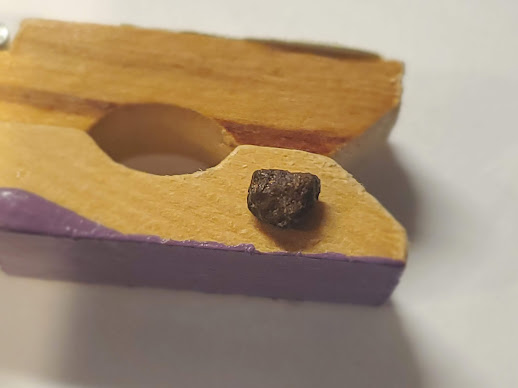I have started trying to find meteorites in my area.
It is amazing to think that I might be able to touch a planetary fragment that has drifted through space, unchanged for billions of years.
Some meteorites may even be older than the Earth, or they might be blasted off of the moon or Mars!
I needed to know a lot more to be a good meteorite hunter, so I consulted The Lunar and Planetary Institute.
I learned it takes patience since meteorites are rare and sometimes tiny. I have been looking for iron meteorites using a walking stick with magnets taped near the tip.
David A. Kring wrote an article for The Lunar and Planetary Institute that says:
I recently found a tiny rock - a speck like a grain of rice - that stuck to my magnet. I wonder if it's a meteorite? I put it on a clothespin to show the scale...
Right now, it looks like it could be a tiny meteorite! I want to be sure, so stay tuned for more information if I can get someone to help identify it.
 |
| Image: NASA; https://mars.nasa.gov/resources/21492/a-martian-meteorite-for-mars-2020/ |
I needed to know a lot more to be a good meteorite hunter, so I consulted The Lunar and Planetary Institute.
I learned it takes patience since meteorites are rare and sometimes tiny. I have been looking for iron meteorites using a walking stick with magnets taped near the tip.
 |
| My hand-carved walking stick with magnets taped near the tip. |
"Iron meteorites are much more common among the meteorite finds, because they are so unlike most terrestrial rocks and because stony meteorites are highly susceptible to weathering on the surface of the Earth."
 |
| Image: NASA; https://www2.jpl.nasa.gov/snc/nwa480.html |
I recently found a tiny rock - a speck like a grain of rice - that stuck to my magnet. I wonder if it's a meteorite? I put it on a clothespin to show the scale...
I checked my little rock using tests from The Lunar and Planetary Institute.
1. Does the sample have a black or brown surface? Yes
2. Is the sample solid, without pores or hollow vesicles? Yes
3. Is the sample heavy for its size? Not sure - too small to tell
4. If a corner of the sample is ground slightly, is the interior metallic silver? Too small to grind.
5. Is the sample unlike other rocks in the area? Yes
6. Is the sample magnetic? Yes
1. Does the sample have a black or brown surface? Yes
2. Is the sample solid, without pores or hollow vesicles? Yes
3. Is the sample heavy for its size? Not sure - too small to tell
4. If a corner of the sample is ground slightly, is the interior metallic silver? Too small to grind.
5. Is the sample unlike other rocks in the area? Yes
6. Is the sample magnetic? Yes
Here are some more photos of different sides. One side is a little darker than the other. Could it be from the reentry heating where one side got "cooked" more than the other?



